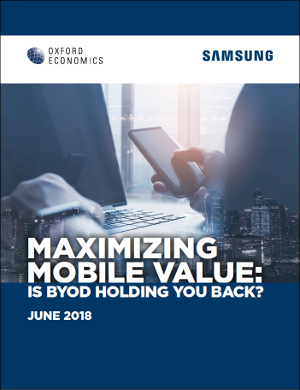Ungated Post | 13 Jun 2018
Maximizing Mobile Value: Is BYOD holding you back?

Mobile work is a strategic priority for many companies, but the fundamental decisions that enable it are too often based on short-term thinking and ad hoc policies.
To better understand the value of various approaches to device adoption, Oxford Economics worked with Samsung in early 2018 to survey 500 senior IT executives, CEOs, and other senior managers across the United States. We focused on the costs and benefits of different ways of providing mobile devices to workers, and on the goals companies have for their mobile efforts. Our research shows that up-front savings do not always maximize long-term value. Companies that depend on employees to provide their own mobile phones—an approach commonly known as Bring Your Own Device, or BYOD—do save money on acquisition costs. But over time there are other costs to consider, while factors such as increased productivity and operational efficiency can make policies that provide phones to some or all employees worth considering.
Slideshow: How Companies Go Mobile
Sign up for the Maximizing Mobile Value Webinar
Oxford Economics’ team is expert at applying advanced economic tools that provide valuable insights into today’s most pressing business, financial, and policy issues.
To find out more about our capabilities, contact:
Americas
Diantha Redd
+1 (646) 503 3052
Email
Asia Pacific
Peter Suomi
+65 6850 0110
Email
EMEA
Aoife Pearson
+44 (0)203 910 8054
Email
Related Services

Post
The economic impact of abandoning the WTO
Oxford Economics have been commissioned by the International Chamber of Commerce (ICC) to provide an independent assessment of the economic impact of WTO dissolution. This report details our findings and the assumptions underpinning our analysis.
Find Out More
Post
The economic impact of the sports activities of public service media
This study shows how the sports activities of public service media supported €4.5 billion of GDP and 57,000 jobs across 31 European countries in 2022, taking direct, indirect (supply chain), and induced (wage-funded expenditure) impacts into account. The report also highlights wider economic benefits of public service media sports coverage, such as the way in which it leverages sponsorship income for sports bodies.
Find Out More
Post
Global Trade Education: The role of private philanthropy
Global trade can amplify economic development and poverty alleviation. Capable leaders are required to put in place enabling conditions for trade, but currently these skills are underprovided in developing countries. For philanthropists, investing in trade leadership talent through graduate-level scholarships is an opportunity to make meaningful contributions that can multiply and sustain global economic development.
Find Out More